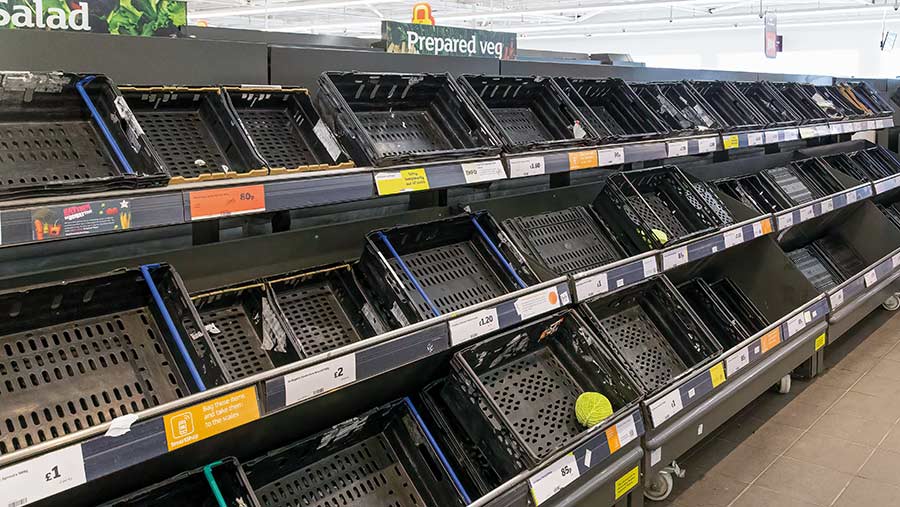Government inaction risks further food shortages, NFU warns
 © Magicbones/Adobe Stock
© Magicbones/Adobe Stock The UK is “sleepwalking” into another food crisis, and the egg supply shortage “could just be the start”, according to the NFU.
Ahead of an emergency press conference on Tuesday 6 December, union leader Minette Batters warned that UK fruit and vegetable growers were under “massive pressure” due to soaring energy costs and workforce shortages.
And pictures of empty egg shelves in supermarkets could soon be mirrored by other sectors due to a lack of fairness for UK farmers and growers throughout the supply chain.
See also: Former MI5 boss says urgent action needed on food security
Mrs Batters said prime minister Rishi Sunak’s government faces a stark choice – back British food production and secure a steady supply of home-grown food, or risk seeing more empty shelves in the nation’s supermarkets.
“Shoppers up and down the country have for decades had a guaranteed supply of high-quality, affordable food produced to some of the highest animal welfare, environmental and food safety standards in the world,” said Mrs Batters, speaking ahead of the press conference.
“That food, produced with care by British farmers, is critical to our nation’s security and success. But British food is under threat.
“We have already seen the egg supply chain crippled under the pressure caused by these issues, and I fear the country is sleepwalking into further food supply crises, with the future of British fruit and vegetable supplies in trouble.”
Sunak pledge
Mrs Batters urged Mr Sunak to honour the commitments he made to support British farmers through the energy crisis and to set a target for the nation’s food security, with a statutory duty to report on domestic food levels.
Last week, the head of MI5, Baroness Manningham-Buller, warned that the UK had taken food security for granted for too long and that the government needs to be consistent in planning for our food supply.
“I couldn’t agree more, particularly at a time when global volatility is threatening the stability of the world’s food production, food security and energy security,” added Mrs Batters.
The farm leader says the government and the wider supply chain must act now to avoid further food shortages seen in the supply of eggs in supermarkets or, “tomorrow could well be too late”. (see “NFU issues five ‘key asks’ of government on food security”)
Defra perspective
However, Defra farm minister Mark Spencer has insisted the UK has a “highly resilient food supply chain”.
Responding to a written question in parliament on food security on 21 November, Mr Spencer said: “We produce 61% of all the food we need, and 74% of food that we can grow or rear in the UK for all or part of the year. These figures have changed little over the past 20 years.”
Mr Spencer added: “Our high degree of food security is built on supply from diverse sources; strong domestic production as well as imports through stable trade routes.”
NFU issues five ‘key asks’ of government on food security
- An urgent investigation by Defra into whether an “exceptional market conditions” declaration should be made under the Agriculture Act 2020, given the severe disruption egg producers and UK consumers are experiencing
- In early 2021, the government announced it would regulate dairy contracts to enable fairer terms for farmers, but this still hasn’t happened. We need the government to progress with their plans to bring fairness in the dairy sector
- Fruit and veg growers need fair treatment and confidence to invest, as well as a commitment from government to lift the cap on the Seasonal Worker Scheme to increase the number of visas available to meet the sector’s essential workforce needs
- British food and farming must be a political priority. Promises made by prime minister Rishi Sunak in August 2022 need to be delivered – in particular by establishing a new food security target, including a statutory duty to monitor and report on domestic food production levels annually, to hold a UK-wide annual food security summit and introduce a new target for public sector organisations to buy 50% of their food locally
- Agriculture and horticulture must be seen as a vulnerable sector with regards to energy security
